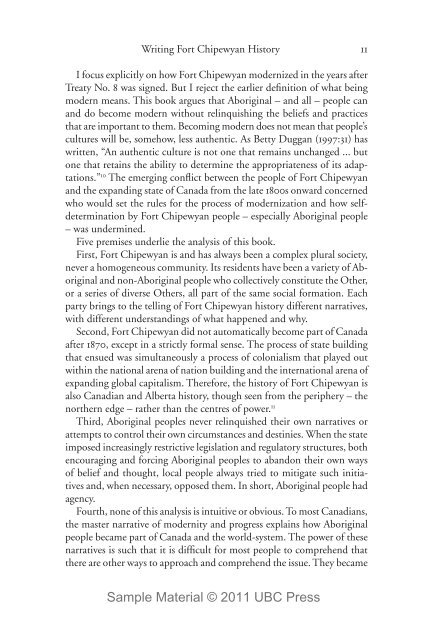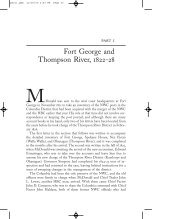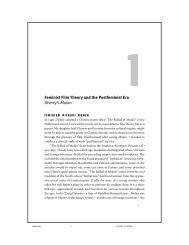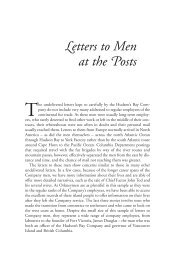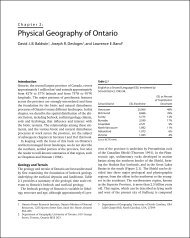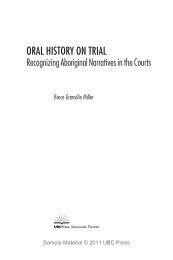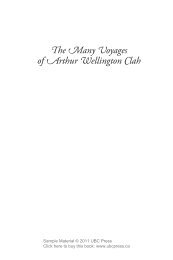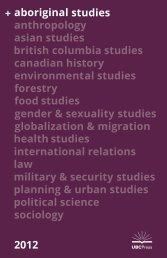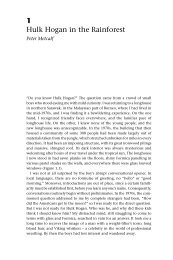Fort Chipewyan and the Shaping of Canadian History ... - UBC Press
Fort Chipewyan and the Shaping of Canadian History ... - UBC Press
Fort Chipewyan and the Shaping of Canadian History ... - UBC Press
You also want an ePaper? Increase the reach of your titles
YUMPU automatically turns print PDFs into web optimized ePapers that Google loves.
Writing <strong>Fort</strong> <strong>Chipewyan</strong> <strong>History</strong><br />
I focus explicitly on how <strong>Fort</strong> <strong>Chipewyan</strong> modernized in <strong>the</strong> years after<br />
Treaty No. 8 was signed. But I reject <strong>the</strong> earlier definition <strong>of</strong> what being<br />
modern means. This book argues that Aboriginal – <strong>and</strong> all – people can<br />
<strong>and</strong> do become modern without relinquishing <strong>the</strong> beliefs <strong>and</strong> practices<br />
that are important to <strong>the</strong>m. Becoming modern does not mean that people’s<br />
cultures will be, somehow, less au<strong>the</strong>ntic. As Betty Duggan (1997:31) has<br />
written, “An au<strong>the</strong>ntic culture is not one that remains unchanged ... but<br />
one that retains <strong>the</strong> ability to determine <strong>the</strong> appropriateness <strong>of</strong> its adaptations.”<br />
10 The emerging conflict between <strong>the</strong> people <strong>of</strong> <strong>Fort</strong> <strong>Chipewyan</strong><br />
<strong>and</strong> <strong>the</strong> exp<strong>and</strong>ing state <strong>of</strong> Canada from <strong>the</strong> late 1800s onward concerned<br />
who would set <strong>the</strong> rules for <strong>the</strong> process <strong>of</strong> modernization <strong>and</strong> how selfdetermination<br />
by <strong>Fort</strong> <strong>Chipewyan</strong> people – especially Aboriginal people<br />
– was undermined.<br />
Five premises underlie <strong>the</strong> analysis <strong>of</strong> this book.<br />
First, <strong>Fort</strong> <strong>Chipewyan</strong> is <strong>and</strong> has always been a complex plural society,<br />
never a homogeneous community. Its residents have been a variety <strong>of</strong> Aboriginal<br />
<strong>and</strong> non-Aboriginal people who collectively constitute <strong>the</strong> O<strong>the</strong>r,<br />
or a series <strong>of</strong> diverse O<strong>the</strong>rs, all part <strong>of</strong> <strong>the</strong> same social formation. Each<br />
party brings to <strong>the</strong> telling <strong>of</strong> <strong>Fort</strong> <strong>Chipewyan</strong> history different narratives,<br />
with different underst<strong>and</strong>ings <strong>of</strong> what happened <strong>and</strong> why.<br />
Second, <strong>Fort</strong> <strong>Chipewyan</strong> did not automatically become part <strong>of</strong> Canada<br />
after 1870, except in a strictly formal sense. The process <strong>of</strong> state building<br />
that ensued was simultaneously a process <strong>of</strong> colonialism that played out<br />
within <strong>the</strong> national arena <strong>of</strong> nation building <strong>and</strong> <strong>the</strong> international arena <strong>of</strong><br />
exp<strong>and</strong>ing global capitalism. Therefore, <strong>the</strong> history <strong>of</strong> <strong>Fort</strong> <strong>Chipewyan</strong> is<br />
also <strong>Canadian</strong> <strong>and</strong> Alberta history, though seen from <strong>the</strong> periphery – <strong>the</strong><br />
nor<strong>the</strong>rn edge – ra<strong>the</strong>r than <strong>the</strong> centres <strong>of</strong> power. 11<br />
Third, Aboriginal peoples never relinquished <strong>the</strong>ir own narratives or<br />
attempts to control <strong>the</strong>ir own circumstances <strong>and</strong> destinies. When <strong>the</strong> state<br />
imposed increasingly restrictive legislation <strong>and</strong> regulatory structures, both<br />
encouraging <strong>and</strong> forcing Aboriginal peoples to ab<strong>and</strong>on <strong>the</strong>ir own ways<br />
<strong>of</strong> belief <strong>and</strong> thought, local people always tried to mitigate such initiatives<br />
<strong>and</strong>, when necessary, opposed <strong>the</strong>m. In short, Aboriginal people had<br />
agency.<br />
Fourth, none <strong>of</strong> this analysis is intuitive or obvious. To most <strong>Canadian</strong>s,<br />
<strong>the</strong> master narrative <strong>of</strong> modernity <strong>and</strong> progress explains how Aboriginal<br />
people became part <strong>of</strong> Canada <strong>and</strong> <strong>the</strong> world-system. The power <strong>of</strong> <strong>the</strong>se<br />
narratives is such that it is difficult for most people to comprehend that<br />
<strong>the</strong>re are o<strong>the</strong>r ways to approach <strong>and</strong> comprehend <strong>the</strong> issue. They became<br />
Sample Material © 2011 <strong>UBC</strong> <strong>Press</strong><br />
11


